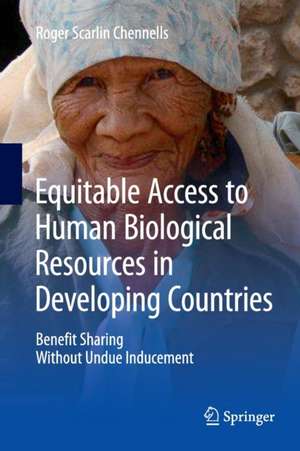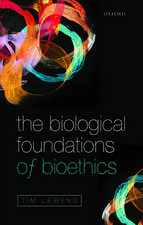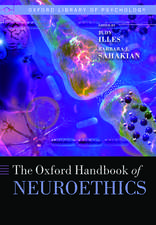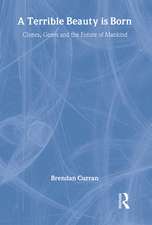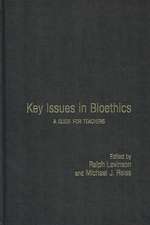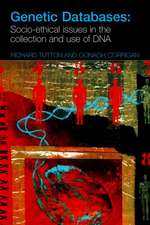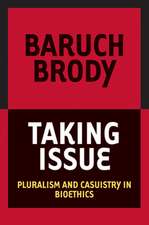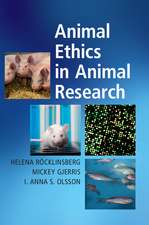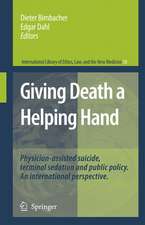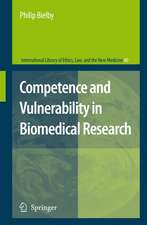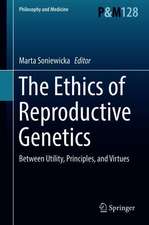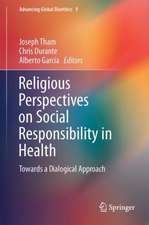Equitable Access to Human Biological Resources in Developing Countries: Benefit Sharing Without Undue Inducement
Autor Roger Scarlin Chennellsen Limba Engleză Paperback – 15 oct 2016
• Benefit sharing is crucial in order to avoid the exploitation of developing countries in human genetic research.
• With functioning research ethics committees, undue inducement is less of a concern in genetic research than in other areas of medical research (e.g. clinical trials).
• Concerns remain over research involving indigenous populations; accordingly, recommendations are provided.
In drawing these conclusions, the book addresses in detail a highly pressing topic in global bioethics and international law. In this regard, it combines bioethical arguments with jurisprudence, in particular with reference to thelaw of equity and the legal concepts of duress (coercion), unconscionable dealing, and undue inducement.
| Toate formatele și edițiile | Preț | Express |
|---|---|---|
| Paperback (1) | 636.63 lei 6-8 săpt. | |
| Springer International Publishing – 15 oct 2016 | 636.63 lei 6-8 săpt. | |
| Hardback (1) | 642.83 lei 6-8 săpt. | |
| Springer International Publishing – 27 iul 2015 | 642.83 lei 6-8 săpt. |
Preț: 636.63 lei
Preț vechi: 748.97 lei
-15% Nou
Puncte Express: 955
Preț estimativ în valută:
121.83€ • 132.29$ • 102.34£
121.83€ • 132.29$ • 102.34£
Carte tipărită la comandă
Livrare economică 23 aprilie-07 mai
Preluare comenzi: 021 569.72.76
Specificații
ISBN-13: 9783319369747
ISBN-10: 3319369741
Pagini: 216
Ilustrații: XIX, 197 p.
Dimensiuni: 155 x 235 x 12 mm
Greutate: 0.31 kg
Ediția:Softcover reprint of the original 1st ed. 2016
Editura: Springer International Publishing
Colecția Springer
Locul publicării:Cham, Switzerland
ISBN-10: 3319369741
Pagini: 216
Ilustrații: XIX, 197 p.
Dimensiuni: 155 x 235 x 12 mm
Greutate: 0.31 kg
Ediția:Softcover reprint of the original 1st ed. 2016
Editura: Springer International Publishing
Colecția Springer
Locul publicării:Cham, Switzerland
Cuprins
Introduction.- Exploitation.- Common Heritage of Humankind.- The Altruism Argument.- The ‘No Value Added’ Argument.- Justice and Exploitation in Bilateral Exchanges.- Undue Inducement and Coercion.- Risks to Indigenous Peoples as Vulnerable Population.- Closing Chapter.
Textul de pe ultima copertă
The main question explored by the book is: How can cross-border access to human genetic resources, such as blood or DNA samples, be governed in such a way as to achieve equity for vulnerable populations in developing countries? The book situates the field of genomic and genetic research within global health and research frameworks, describing the concerns that have been raised about the potential unfairness in exchanges during recent decades. Access to and sharing in the benefits of human biological resources are aspects not regulated by any international legal framework such as the Convention on Biological Diversity, which applies only to the exchange of plants, animals and microorganisms, as well as to associated traditional knowledge. Examples of genetic research perceived as exploitative are provided in order to illustrate the legal vacuum concerning the global governance of human genetic resources. The main conclusions drawn from the legal and ethical analysis are:
• Benefit sharing is crucial in order to avoid the exploitation of developing countries in human genetic research.
• With functioning research ethics committees, undue inducement is less of a concern in genetic research than in other areas of medical research (e.g. clinical trials).
• Concerns remain over research involving indigenous populations; accordingly, recommendations are provided.
In drawing these conclusions, the book addresses in detail a highly pressing topic in global bioethics and international law. In this regard, it combines bioethical arguments with jurisprudence, in particular with reference tothe law of equity and the legal concepts of duress (coercion), unconscionable dealing, and undue inducement.
• Benefit sharing is crucial in order to avoid the exploitation of developing countries in human genetic research.
• With functioning research ethics committees, undue inducement is less of a concern in genetic research than in other areas of medical research (e.g. clinical trials).
• Concerns remain over research involving indigenous populations; accordingly, recommendations are provided.
In drawing these conclusions, the book addresses in detail a highly pressing topic in global bioethics and international law. In this regard, it combines bioethical arguments with jurisprudence, in particular with reference tothe law of equity and the legal concepts of duress (coercion), unconscionable dealing, and undue inducement.
Caracteristici
Provides a revealing explanation of and argument for the importance of benefit sharing in genetic research Presents a condensed summary of the specific concerns faced by indigenous peoples in genetic research, including recommendations Features guidelines for dealing with ethical concerns such as undue inducement, which are essential to developing world genetic research Includes supplementary material: sn.pub/extras
